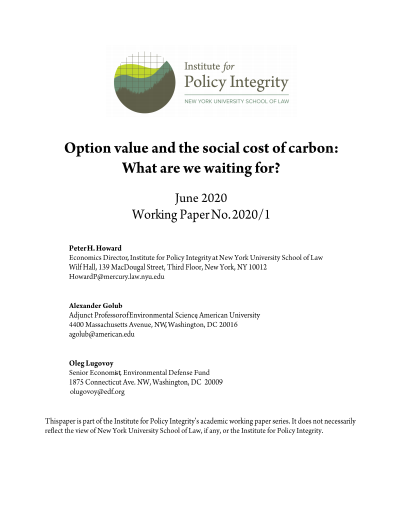-
Comments to New Jersey BPU on Resource Adequacy Alternatives
The New Jersey Bureau of Public Utilities (BPU) requested public input on its investigation of resource adequacy alternatives. We submitted comments encouraging the New Jersey BPU to recognize important uncertainties affecting the proceeding, consider a broad range of costs of pursuing a Fixed Resource Requirement, and explore the possibility of a carbon pricing program in addition to participation in the Regional Greenhouse Gas Initiative.
-
Option Value and the Social Cost of Carbon
What Are We Waiting For?
Scientists and economists have long recognized that significant uncertainties and irreversibility characterize climate change. And yet, the social cost of carbon (SCC), the preeminent policy tool to address climate change applied by the U.S. government, does not include the option value (OV) that arises due to these characteristics. We demonstrate a simple methodology for approximating the OV underlying the SCC using the Bachelier formula
-
Joint Comments to CFTC on Climate-Related Market Risk
The Commodity Futures Trading Commission (CFTC) requested public input on issues relevant to its Climate-Related Market Risk Subcommittee. We submitted joint comments highlighting the significant financial risks that climate change poses and emphasizing that an economy-wide price on carbon emissions is the regulatory tool that will be the most effective in mitigating a climate-related financial crisis.
-
Comments to PHMSA on Data Collection from Pipeline Accidents
The Pipeline and Hazardous Materials Safety Administration (PHMSA) is proposing to gather additional data on pipeline accidents and fires, including data on injuries, property damage, and loss of natural gas. We submitted comments supporting PHMSA’s efforts to better assess the social cost of accidents and encouraging the agency to estimate greenhouse gas emissions that result from pipeline fires.
-
Comments to SEC on Regulation S-K and Climate Risk
The Securities and Exchange Commission (SEC) proposed a rule modifying Regulation S-K, which governs reporting requirements for public companies. We submitted comments focusing on the SEC’s failure to require disclosure of risks relating to climate change. Climate risks are economy-wide impacts in which the future increasingly diverges from past experience, and predicting such risks requires more granular data than is typically disclosed in financial reporting. We suggest that the SEC adopt a more specific line-item approach to climate risk reporting, similar to the framework suggested under the Task Force on Climate-Related Financial Disclosures.
-
New Resource Tracking Reduced Enforcement of Environmental Laws in Response to COVID-19
The Institute for Policy Integrity is tracking altered enforcement of environmental laws by federal and state agencies in response to the COVID-19 pandemic. In connection with the crisis, several agencies have issued waivers or announced plans to stop enforcing key environmental laws and regulations.
-
Comments to the Colorado Public Utilities Commission on Electricity Rule Changes
The Colorado Public Utilities Commission is amending its rules relating to utilities, electric resource planning, and renewable energy standards. We submitted comments explaining why the Commission should use Social Cost of Greenhouse Gases estimates to monetize the externalities of carbon pollution. Our recommendations include rule revisions and new language that will help include monetized estimates of climate impacts in all relevant decisionmaking. We also submitted comments and reply comments on additional rule revisions, building on our original comments to further describe how the Commission can best express and apply the Social Cost of Greenhouse Gases.
-
Amicus Brief on EPA’s Clean Power Plan Replacement Rule
Last year, the Environmental Protection Agency (EPA) replaced the Obama Administration’s Clean Power Plan, which sought substantial cuts in greenhouse gas emissions from power plants, with the so-called Affordable Clean Energy (ACE) rule, a far weaker policy that will, at best, yield modest reductions below business-as-usual emissions and, at worst, increase pollution from the electric sector. We filed an amicus brief in the U.S. Court of Appeals for the D.C. Circuit highlighting three key errors in EPA’s rationale for repealing the Clean Power Plan. Specifically, we explain, EPA misstates regulatory precedent and Clean Air Act legislative history supporting the Clean Power Plan and disregards the substantial harms that the ACE Rule will cause.
-
Comments to FERC Supporting Petition for Technical Conference on Carbon Pricing
Advanced Energy Economy, the Electric Power Suppliers Association, and a diverse group of other stakeholders recently filed a petition for the Federal Energy Regulatory Commission (FERC) to hold a technical conference on carbon pricing in organized wholesale electricity markets. We have worked extensively to study and promote carbon pricing, publishing a comprehensive report and several academic articles. We also hosted a conference that brought together experts and stakeholders to discuss related legal, economic, and policy questions. Our comments to FERC highlight our previous work on wholesale market carbon pricing and express our support for the requested technical conference.
-
Comments to FERC on Lamar County Natural Gas Project
The Federal Energy Regulatory Commission’s (FERC) environmental assessment estimates that the Lamar County Expansion Project would result in 3.87 million metric tons of greenhouse gases from downstream emissions. We submitted comments suggesting that FERC monetize climate impacts using social cost of carbon estimates. The proposed natural gas project would result in over $200 million in annual climate costs.
Viewing recent projects in Climate and Energy Policy








